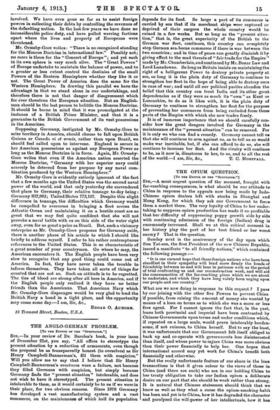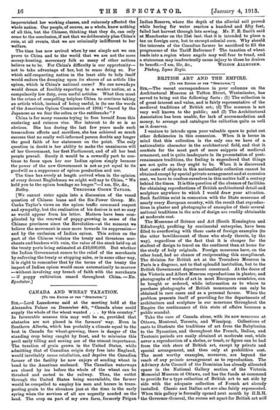THE OPIUM QUESTION. [To Tar EDTIOB. OF TIM "SPECTLTOR.']
Siu,—A most urgent question of the moment, fraught with far-reaching consequences, is what should be our attitude to China in response to the appeals now being made by Indo- Chinese opium dealers left with stocks in Shanghai and Hong Kong, for which they ask our Government to force them a market there. The very loyalty of China to her under- taking to suppress opium production has made it so profitable that her difficulty of suppressing poppy growth side by side with continuing admission of the foreign (Indian) drug is enormously increased. Shall we at this critical moment in her history play the part of her best friend or her worst enemy P That is the question.
Sunday next is the anniversary of the day upon which Sun Yat-sen, the first President of the new Chinese Republic,
issued a manifesto "to all friendly nations," which contained the following passage :—
"It is our earnest hope that those foreign nations who have been steadfast in their sympathy will bind more firmly the bonds of friendship between us and will bear in patience with us the period of trial confronting us and our reconstruction work, and will aid the consummation of tho far-reaching plans which we are about to undertake, and which they have long vainly been urging upon our people and our country."
What are we now doing in response to this request P I pass by our joining with the other five Powers to prevent China if possible, from raising the amount of money she wanted by means of a loan on terms as to which she was a more or less free agent. For I cannot ignore the fact that, in the past, loans both provincial and imperial have been contracted by Chinese Governments upon terms and under conditions which, if repeated on a large scale, would prove intolerably burden- some, if not ruinous, to China herself. Bat to say the least, it was unfortunate that our Government felt itself obliged to back up and co-operate with governments less disinterested than itself, and whose power to injure China was more obvious than their power financially to help her. One hopes that international accord may yet work for China's benefit both financially and otherwise.
But the really unfortunate feature of our share in the loan transactions is that it gives colour to the views of those in China (and there are such) who see in our holding China to her treaty obligation to take our Indian opium a deliberate
desire on our part that she should be weak rather than strong. It is natural that Chinese statesmen should think that we know as well as they what a curse the opium-smoking habit has been and yet is to China, how it has degraded the character and paralyzed the will-power of her intellectuals, how it has
impoverished her working classes, and ruinously affected the whole nation. Our people, of course, as a whole, know nothing of all this, but the Chinese, thinking that they do, can only come to the conclusion, if not that we deliberately plan China's ruin, at all events, that we are criminally indifferent to her welfare.
The time has now arrived when by one simple act we can prove to China and to the world that we are not the more money-hunting, mercenary folk so many of other nations believe us to be. For China's difficulty is our opportunity— not to take advantage of her, but to cease doing so. For which self-respecting nation in the least able to help itself would endure the dumping upon its shores of an article like opium, which is China's national curse ? No one nowadays would dream of forcibly exporting to a weaker nation, at a compulsorily low duty, even useful articles. What then must be the crime of compelling helpless China to continue taking an article which, instead of being useful, is (to use the words of the American Opium Commission of 1904) "feared by the Japanese as we fear the cobra or the rattlesnake " ?
China is for many reasons trying to free herself from this enslaving and ruinous vice. Her interest to do so is so obvious. She has during the last few years made such tremendous efforts and sacrifices, she has achieved so much success that no really well-informed person doubts any longer the good faith of her statesmen on the point. The only question in doubt is her ability to make the unanimous will of her Government, her first Parliament, and of all her best people prevail. Surely it would be a cowardly part to con- tinue to force upon her our Indian opium simply because the power of the new Government is not as yet equal to its goodwill as a suppressor of opium production and use.
The time has snrely at length arrived when in the opinion of every decent Englishman we might well say to China, "We hold you to the opium bondage no longer."—I am, Sir, &c.,
Batley. THEODORE COOKE TAYLOR.
[We cannot enter again into a discussion of the vexed question of Chinese loans and the Six-Power Group. Mr. Cooke Taylor's views on the opium traffic command respect and sympathy, but the realization of his desires is not so easy as would appear from his letter. Matters have been com- plicated by the renewal of poppy-growing in some of the Chinese provinces since the Revolution—at the moment we believe the movement is once more towards its suppression— and by the exclusion of Indian opium. This action on the part of the Chinese violates the treaty and threatens mer- chants and bankers with ruin, the value of the stock held up at the treaty ports being estimated at £10,000,000. But whether the Indian Government comes to the relief of the merchants by enforcing the treaty or stopping sales, or in some other way, it is right to remember that by the terms of the treaty the import of Indian opium would cease automatically to-morrow —without involving any breach of faith with the merchants — if poppy cultivation ceased throughout China. —En. Spectator.]























































 Previous page
Previous page